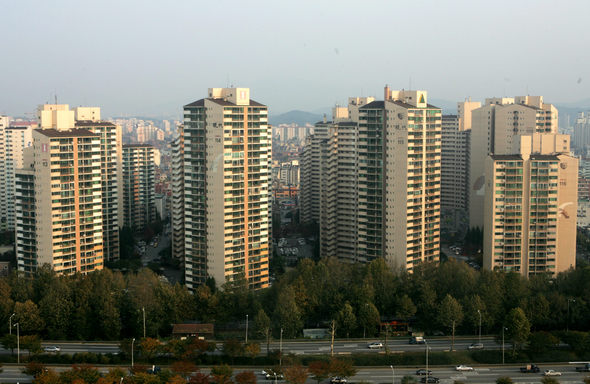 |
|
Is house bubble imminent?
|
Real-estate watchers forecast rise instead
While the government warns that the current pricing bubble in the nation's real estate market may burst, many analysts say that prices will continue to rise. The conflicting opinions have caused further anxiety for many potential home buyers. Is a burst housing bubble imminent? It is not just the government that warns of a bubble burst in the real estate market. The U.N.’s Economic and Social Commission for Asia and the Pacific (ESCAP) last month said that the real estate markets in South Korea, Hong Kong and China are facing an imminent bubble burst as property prices are on the rise. Even Morgan Stanley said South Korea has to brace itself for such a shift, which could be prompted by the recent downward trend in the U.S. market. Earlier this month, the Bank of Korea supported outside warnings, saying that housing prices have neared a level comparable to that in the early 1990s, just before prices dropped about 25 percent. "Abnormal price hikes in housing will inevitably be followed by price plunges. This is a lesson that we learned from Japan," one expert said.Between 2003 and 2005, the prices of apartments in South Korea increased 15.3 percent, more than twice the income growth rate of 7.4 percent, statistics released by the Kookmin Bank showed. The prices of apartments in Seoul’s Gangnam district jumped 28 percent during the same period. Statistics unveiled by the Bank of Korea show an even bleaker picture for home buyers. According to the central bank, in 2004 a 33-pyeong (110 square meter) apartment in Seoul was priced 9.9 times higher than the average annual income in an urban area. The figure rose to 10.3 last year. In the Gangnam district, the corresponding figure jumped from 13.6 to 18.9, meaning that an average person living in Seoul would have to work 19 years--without losing a dime--to buy the 33-pyeong apartment. What impact would a burst bubble have? " If the property prices nosedive, it would force many people who bought their houses with short-term bank loans to dump them on the selling block. This would in turn prompt a second price drop, sending repercussions throughout the national economy," a Kookmin Bank official forecast. Experts warned that things would get worse if the price drop comes with an interest rate hike. For example, assume that a person bought an apartment for 1.1 billion won (1.1 million USD)--not an exceptionally high price in the competitive Seoul housing market--for which she borrowed 400 million won from a bank at an interest rate of 5.7 percent. She currently has to pay 1.9 million won in interest on a monthly basis for the borrowed money, and including the taxes that she has to pay for holding the property, the total she owes monthly amounts to 2.44 million won. A plunge in value of the apartment--her investment--coupled with an interest rate hike, would mean rapidly rising costs and a much greater financial burden on the buyer overall. "Last year, the value of a household's financial assets rose 8 percent. But its debt jumped 11.2 percent, making the debt-to-asset ratio nearly 1:1, the highest level ever," said an official at the Bank of Korea. The figure is well above the figure in advanced nations of debt amounting to 20-30 percent of asset value, he added. Worse still, the official said, about 86 percent of household debt is subject to a floating interest rate, meaning they would be severely affected by an interest rate hike. Is a drop really on the horizon? Some analysts countered the warnings, saying that the market has yet to reach a point where a bubble bursts is imminent, though they admit that the price of property has neared an all-time high, which is usually the signal of an impending drop in housing prices. "The bubble in the real-estate market will likely disappear in five years, when new houses in [the satellite city of] Songpa are put on the selling block," a real estate expert forecast.





